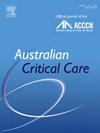“How to navigate this new area”: Intensive care clinicians’ perceptions of voluntary assisted dying in the intensive care unit: A multisite exploratory study
IF 2.6
3区 医学
Q2 CRITICAL CARE MEDICINE
引用次数: 0
Abstract
Background
There is growing momentum worldwide for assisted dying. In Australia, voluntary assisted dying may occur in any setting, including an intensive care unit (ICU). As the subject of much debate worldwide, exploring ICU clinicians’ perceptions of assisted dying is essential.
Aim
The aim of this study was to explore clinicians’ perceptions of and preparedness for voluntary assisted dying in the ICU.
Method
An exploratory qualitative descriptive design using individual interviews was used. Medical, nursing, and allied health clinicians from three ICUs were recruited. Interviews were conducted between Nov 2022 and Jan 2023, with a hypothetical scenario about voluntary assisted dying used to prompt discussion. Interviews were recorded, professionally transcribed, and analysed using inductive content analysis.
Findings
ICU registered nurses (n = 20), physicians (n = 2), and allied health clinicians (n = 4) participated with interviews lasting 18–45 min (mean: 28 min). Analysis revealed four themes: (i) purpose of ICU reflected that ICU care was not all about saving lives, yet recognising dying and changing priorities was challenging; (ii) dying in the ICU is complex due to difficulties in talking about dying, accepting death as the outcome and evaluating care efficacy; (iii) voluntary assisted dying is a lot of grey because of perceived clinical and ethicolegal challenges; and finally, (iv) respecting choice was about respecting patients' values, beliefs, and autonomy, as well as clinicians’ beliefs and right to exercise autonomy through conscientious objection.
Conclusion
Dying and death are inevitable, and views and perspectives about assisted dying will continue to evolve. Respecting patient choice is at the core of assisted dying, but respecting clinicians’ perspectives and choice is equally important. With voluntary assisted dying now legal in all Australian states, ensuring ICU team and individual clinician preparedness through access to education, resources, and specialist support services is key to raising awareness and easing uncertainty about deaths through voluntary assisted dying.
"如何驾驭这一新领域":重症监护室临床医生对重症监护室自愿协助死亡的看法:一项多地点探索性研究。
背景:全球范围内,协助死亡的势头日益强劲。在澳大利亚,包括重症监护病房(ICU)在内的任何环境中都可能出现自愿的辅助死亡。作为全球范围内争论不休的话题,探讨重症监护室临床医生对协助死亡的看法至关重要。目的:本研究旨在探讨重症监护室临床医生对自愿协助死亡的看法和准备情况:方法:采用个别访谈的探索性定性描述设计。招募了来自三个重症监护室的医疗、护理和专职医疗临床医生。访谈在 2022 年 11 月至 2023 年 1 月期间进行,通过一个关于自愿协助死亡的假设情景来引发讨论。对访谈进行录音、专业转录,并采用归纳内容分析法进行分析:ICU注册护士(n = 20)、医生(n = 2)和专职医疗临床医生(n = 4)参与了访谈,访谈持续了18-45分钟(平均:28分钟)。分析发现了四个主题:(i) ICU 的目的反映出 ICU 的护理并不完全是为了挽救生命,但认识到死亡和改变优先事项具有挑战性;(ii) 由于在谈论死亡、接受死亡结果和评估护理效果方面存在困难,ICU 中的死亡问题非常复杂;(最后,(iv) 尊重选择是指尊重患者的价值观、信仰和自主权,以及临床医生的信仰和通过良心反对行使自主权的权利。结论:垂死和死亡是不可避免的,关于协助死亡的观点和看法也将继续演变。尊重病人的选择是协助死亡的核心,但尊重临床医生的观点和选择同样重要。目前,澳大利亚各州均已将自愿协助死亡合法化,因此,通过提供教育、资源和专家支持服务,确保重症监护室团队和临床医生个人做好准备,是提高对自愿协助死亡的认识并缓解其不确定性的关键。
本文章由计算机程序翻译,如有差异,请以英文原文为准。
求助全文
约1分钟内获得全文
求助全文
来源期刊

Australian Critical Care
NURSING-NURSING
CiteScore
4.90
自引率
9.10%
发文量
148
审稿时长
>12 weeks
期刊介绍:
Australian Critical Care is the official journal of the Australian College of Critical Care Nurses (ACCCN). It is a bi-monthly peer-reviewed journal, providing clinically relevant research, reviews and articles of interest to the critical care community. Australian Critical Care publishes peer-reviewed scholarly papers that report research findings, research-based reviews, discussion papers and commentaries which are of interest to an international readership of critical care practitioners, educators, administrators and researchers. Interprofessional articles are welcomed.
 求助内容:
求助内容: 应助结果提醒方式:
应助结果提醒方式:


